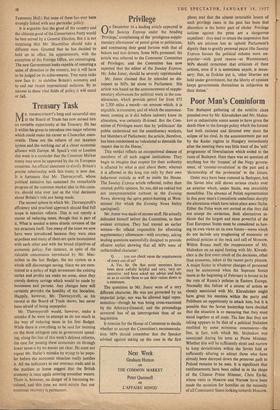Poor Man's Cominform
THE Budapest gathering of the satellite clans presided over by Mr. Khrushchev and Mr. Malen- kov in indissoluble union seems to have given the death-blow to the foreign policy which the former had both initiated and directed ever since the eclipse of his rival. In the announcement put out by the Kadar regime in Hungary immediately after the meeting there was little trace of the 'soft' programme of liberalisation which ended in the ruins of Budapest. Here there was no question of anything but the 'treason' of the Nagy govern- ment, of 'counter-revolution' in the past and a 'dictatorship of the proletariat' in the future.
Order may have been restored in Budapest, but the Soviet bloc still shows serious cracks over an exterior which, under Stalin, was invariably monolithic. The absence of Polish representation in this poor man's Cominform underlines sharply the alterations which have taken place since Stalin. Either the Poles were not invited or else they did not accept the invitation. Both alternatives in- dicate that the largest and most powerful of the East European States must be considered as hav- ing its own views on its own future--views which do not include any toughening of economic or political policies at the beck and call of Moscow. Within Russia itself the reappearance of Mr. Malenkov on an equal footing with Mr. Khrush- chev is the first overt result of the decisions, other than economic, taken at the recent party plenum. A major factor in whatever changes of personnel may be announced when the Supreme Soviet meets at the beginning of February is bound to be the ruin of Russia's policies in Eastern Europe. Normally this failure of a course of action so closely associated with Mr. Khrushchev might have given his enemies within the party and Politburo an opportunity to attack him, but it is possible that the Soviet leadership have decided that the situation is so menacing that they must stand together at all costs. The line that they are taking appears to be that of a political Stalinism modified by some economic concessions—the line, in fact, with which Mr. Malenkov was associated during his term as Prime Minister. Whether this will be sufficiently strait and narrow to keep deviationists within the Soviet fold or sufficiently alluring to attract those who have already been decoyed down the primrose path to Poland remains to be seen. It is significant that reinforcements have been called in in the shape of the Chinese Prime Minister, Chou En-lai, whose visits to Moscow and Warsaw have been made the occasion for homilies on the necessity of all Communist States looking towards Moscow.


































 Previous page
Previous page